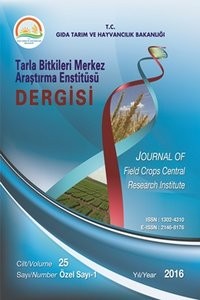Türkiye Tohumculuk Sektöründeki Gelişmeler ile Bu Gelişmelerin Sertifikalı Tohumluk Kullanımına ve Verim Üzerine Muhtemel Etkileri
Öz
İnsan
ve hayvan beslenmesi için tarımda verim ve üretimin artırılmasında, en önemli
teknolojik girdi tohumdur. Bitkisel üretimde üstün nitelikli tohum kullanılması
kendine döllenen türlerde %20-30’luk, yabancı döllenen türlerde kullanılan
hibrit tohumluklarla ise %100’ün üzerinde bir verim artışı sağlanabilmektedir.
Verimlilik ve üretimde son derece önemli olan tohumun bu özelliğinin tarımda
kullanılabilmesi ise tohumculuk sektörünün gelişmesi, kamu ve özellikle de özel
sektör için gerekli olan yapısal ve yasal düzenlemelere ve yatırımlara
bağlıdır. Ülkemizde 1980’li yıllara kadar kamu ağırlıklı, 1985’li yıllardan
itibaren özel sektörün de yer aldığı, bilimsel ve teknolojik gelişmeler, tohum
sistemlerindeki değişimler esas alınarak dünya ile bütünleşmeyi hedefleyen
tohumculuk politikaları benimsenmiştir. Bu çerçevede 2004 yılında “Yeni Bitki
Çeşitlerine Ait Islahçı Haklarının Korunması” ve 2006 yılında “Tohumculuk”
kanunlarının kabulü ile Türk tohumculuk sektörü önemli ivmeler kazanmış ve
yeniden yapılanmaya başlamıştır. Tohumculuk sektöründeki gelişmelere bağlı
olarak ülkemizde sertifikalı tohumluk üretim ve kullanımı yıllar içinde
artmıştır. Sertifikalı buğday tohumluk üretimi 1996 yılında 110 bin ton iken
2013 yılında 421 bin tona ulaşmıştır. Özel sektör tohumculuğundaki gelişme daha
hızlı olmuş ve 1996 yılında sertifikalı tohumluk buğday üretimindeki payı %4
den 2013 yılında %58’e yükselmiştir. Sertifikalı tohumluk kullanım desteğinden
2005 yılında 5.4 milyon da alan yararlanırken 2013 yılında ise 15.5 milyon da
alan sertifikalı tohumluk kullanım desteğinden faydalanmıştır. Türkiye ortalama
buğday verimi yıllar içinde artış göstermiş; 1996 yılında dekara verim 198 kg,
2006 yılında 236 kg ve 2013 yılında 284 kg yükselmiştir. Verimde meydana gelen
bu artışta sertifikalı tohumluk kullanımının etkisi göz ardı edilemez.
Anahtar Kelimeler
Kaynakça
- Anonim, 2015. TÜİK, Türkiye İstatistik Kurumu, http://tuikapp.tuik.gov.tr/bitkiselapp/bitkisel.zul (Erişim tarihi: 12.08.2015).
Öz
Seed is the most important input in agriculture for
increasing yield and production for human nutrition and animal feeding. Seed
quality with appropriate agronomic practices may increase yield of crops up to
20-30%in self-pollinated crops whereas 100% in hybrids. To get benefit from the
advantage of certified seed depends on the level of development of seed sectors
in the countries. However, development of seed sectors requires structural
adjustment, legal arrangements and investments for seed sectors in public and
especially private sectors. In our country seed sector was mainly controlled by
the public until 1980. Since the 1985s, seed sector including private sector
aiming to been integrated with the world seed policies based on to scientific
and technological developments and changes in seed systems has been developed.
In this context, Turkish seed sector have gained momentum and began
restructuring with the adoption of the laws, “Protection of Breeder’s Rights for New Plant Varieties” in 2004
and “Seed" in 2006. Depending on
the developments of certified seed sector in our country, seed production and
use has increased over the years. While it was 110 thousand tons in 1996,
certified wheat seed production reached to 421 thousand tons in 2013. Private
seed sector has been developed faster and their share in certified wheat seed
increased to 58%in 2013 from 4%in 1996. Whereas approximately 5.4 million
decare area was subsided for certified seed usage in 2005, it reached to 15.5
million decare in 2013. Turkey showed an increase in the average yield of wheat
in the year; In 1996, the yield per decare to 198 kg, 236 kg in 2006 and
reached 284 kg in 2013. The impact of certified seed use in this increase occurred
in the yield cannot be underestimated.
Anahtar Kelimeler
Kaynakça
- Anonim, 2015. TÜİK, Türkiye İstatistik Kurumu, http://tuikapp.tuik.gov.tr/bitkiselapp/bitkisel.zul (Erişim tarihi: 12.08.2015).
Ayrıntılar
| Bölüm | Makaleler |
|---|---|
| Yazarlar | |
| Yayımlanma Tarihi | 30 Kasım 2016 |
| Yayımlandığı Sayı | Yıl 2016 Cilt: 25 Sayı: ÖZEL SAYI-1 |


